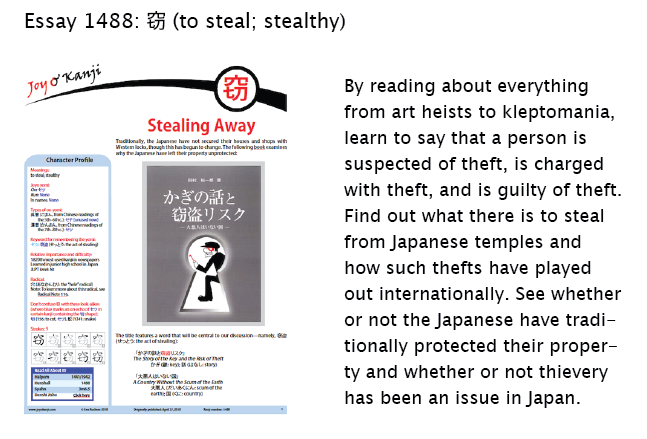A Leg to Stand On
Let's start with a quiz. Match the Japanese to the English definitions, steering clear of the one false option:
1. и„љжњ¬ (гЃЌг‚ѓгЃЏгЃ»г‚“) leg, foot + book
2. 脚色 (きゃくしょく) leg, foot + color
3. и¶ігЃЊеђЉг‚‹ (гЃ‚гЃ—гЃЊгЃ¤г‚‹) foot + to hang
4. 脹脛 (ふくらはぎ) to bulge + leg
a. dramatization (e.g., film)
b. to have one's leg cramp
c. script; screenplay
d. calf
e. to have writer's block
Note that although I've used the most common definition of each kanji in the breakdowns, those meanings may not actually apply. That is, I'm being naughty—or perhaps I should say that I'm pulling your leg!
I'll block the answers with a preview of the newest essay, which is about more wrongdoing.
Did you notice that the quiz contained a whopping three kanji that can represent "leg" or "foot" or both?! The following "leg, foot" character appeared twice:
и„љ (leg, foot; to move on foot; plot of play)
Its Joyo readings are г‚гѓЈг‚Ї, г‚гѓЈ, and гЃ‚гЃ—, a kun-yomi that makes и„љ homophonous with и¶і in its kun-yomi form.
Although и„љ can certainly mean "leg" and "foot," Kanjigen says that in the two quiz words it means "something constituting the lower part or base of something else, providing support," as in this term:
и„љжіЁ or и„љиЁ» (гЃЌг‚ѓгЃЏгЃЎг‚…гЃ†: footnote) supportive base + annotation, comments
In the second rendering, иЁ» is non-Joyo.
These are the first two quiz answers:
1.c. и„љжњ¬ (гЃЌг‚ѓгЃЏгЃ»г‚“: supportive base + book) means "script; screenplay; scenario." Most likely, the idea behind и„љжњ¬ is that the script is the basis for a movie or a stage play. We find the same concept with the synonym еЏ°жњ¬ (гЃ гЃ„гЃ»г‚“: script; screenplay; scenario, platform + book).
2.a. 脚色 (きゃくしょく: supportive base + appearance) means "dramatization (e.g., film)." Three dictionaries say that, in ancient China, 脚色 meant "the personal history that one turns in when entering government service." From that 脚色 came to mean "plot (in a play)." That's quite a leap!
Speaking of leaps, two of those three и„љ words came from a Japanese Wikipedia article about the Okinawan writer Shun Medoruma. They emerged during a Skype chat in autumn with my language partner Kensuke, but rather than blogging about them then, I saved them for the right time. That time is now, on the heels (get it?!) of my most recent talk with Kensuke, which was about his running a marathon for the first time!
I'm astounded by this, and I feel a strangely "parental" pride swelling in my chest! He is 37 and showed no interest in running until four years ago, then gave it a go, slowly increasing his distance. Now comes this incredible achievement! I've been an on-again off-again runner (if I can dare to use that word) for decades, and I never get any better. His trajectory reminds me of people who take up Japanese and just a few years later achieve fluency and hang out their shingle as translators. I don't have the slightest idea how this is humanly possible!
With both running and Japanese studies, I don't have much in the way of velocity. But in talking to Kensuke about his marathon, I did learn this word:
гѓњгѓгѓњгѓ (physically worn out)
He also mentioned these terms, which are quiz answers:
3.b. 脹脛 (ふくらはぎ: calf) to bulge + leg
4.d. и¶ігЃЊеђЉг‚‹ or и„љгЃЊеђЉг‚‹ (гЃ‚гЃ—гЃЊгЃ¤г‚‹: to have one's leg cramp) leg + to have a cramp
Of the various kanji used to represent these two quiz words, only 足 and 脚 are in the Joyo set. Thus, the Japanese usually write ふくらはぎ and つる in hiragana. That's unfortunate because 脹脛 gives us a great doubling of 月, the "flesh" radical. God only knows what's going on on the right side of 脛, but it looks like fun!
As for еђЉ, it primarily means "to hang" as a transitive verb and "to have a cramp" as an intransitive verb. If one were to render гЃ¤г‚‹ in kanji, it's actually more common to write the verb as ж”Јг‚‹, though that's still quite rare. What an insane character that non-Joyo concoction is!
By the way, Kensuke mentioned these words because he developed a terrible cramp in his calf early in the race. But he prevailed and finished! Way to go! Maybe there's hope for us all with whatever types of marathons we're running!
вќ–вќ–вќ–
Did you like this post? Express your love by supporting Joy o' Kanji on Patreon:



Comments